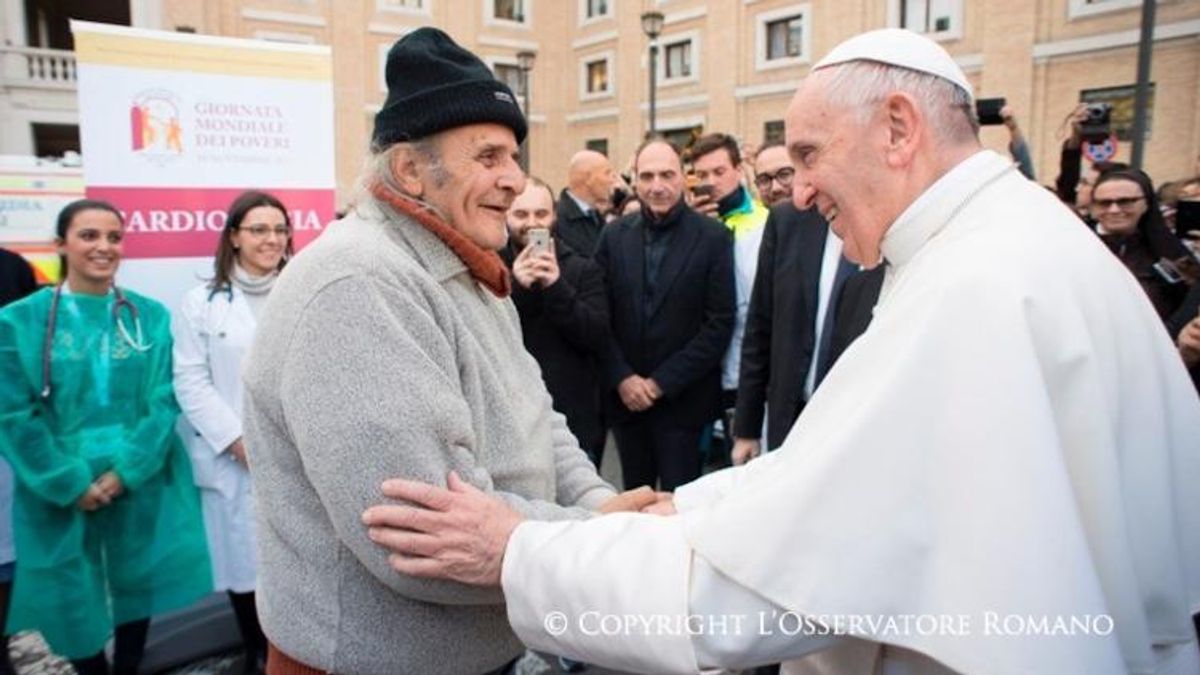Pope Francis's comments supporting civil unions appear to have been taken from a 2019 interview in which he reiterated the Roman Catholic Church's opposition to sexual relationships between people of the same gender.
The opposition should surprise no one, as that is official church doctrine, but it provides context for Francis's remarks.
The clip of his civil unions statement, which is in the new documentary Francesco, is apparently from an interview the pope did with Mexican TV network Televisa, according to an analysis by the National Catholic Reporter, an independent publication covering the church. The interview aired in May 2019.
"Although Francis did say in that television interview, as shown in the documentary, that gay people are 'children of God' and 'have a right to be part of the family,' the pope also added: 'That does not mean approving of homosexual acts, not in the least,'" NCR reports. Another analysis, by The Washington Post, says "children of God" referred to actual children, probably those being raised by same-sex couples, not adults in those relationships. But he did suggest that civil unions may be a way for governments to provide legal recognition to same-sex couples.
The civil unions remark was not used in the Televisa broadcast, but comparison of it with other parts of the Televisa interview indicates it was from that, according to NCR. Televisa later confirmed that is was and gave conflicting statements as to why it was not used. Officials with the network initially said it did not fit the focus of the program, clergy sexual abuse, then said the Vatican, which controlled the taping of the interview, had not released it for use.
A Televisa spokesman told the Post the reporter who interviewed Francis, Valentina Alazraki, said that Francis had spoken in support of civil unions previously, so it was not particularly newsworthy. Yet she told other outlets that she did not recall that part of the interview.
Evgeny Afineevsky, the director of Francesco, had previously said the pope made the comment directly to him for the film. NCR had not been able to reach him for clarification. The filmmaker, who is gay, accepted an award for the movie from the Rome Film Festival during a Vatican ceremony Thursday but declined to speak to reporters there.
"The debate over the comment's origins doesn't change the significance of what the pope said, but it does introduce questions about the filmmaker's methods," the Post reports. "It also raises questions about whether the Vatican had initially been uncomfortable with the remarks or asked the Mexican channel to cut them at the time. Francis is known for making news while speaking off the cuff, sometimes leaving his media handlers to do damage control."
At any rate, this is Francis's highest-profile statement in support of civil unions since he became pope in 2013. He promoted civil unions as an alternative to marriage equality in 2010 when, under his given name of Jorge Mario Bergoglio, he was archbishop of Buenos Aires; Argentina, however, did adopt a marriage equality law. He made similar comments in a book published in 2014 and an interview with Italian newspaper Corriere Della Sera in 2017, but those did not receive widespread attention.
The latest remarks have been met with both praise and skepticism from advocates for LGBTQ+ equality, and with denunciation from conservative forces within the Catholic Church and other Christian denominations. For instance, prominent U.S. evangelical Protestant leader Franklin Graham wrote on Facebook, "For Pope Francis to attempt to normalize homosexuality is to say that Holy Scriptures are false, that our sins really don't matter, and that we can continue living in them."
But the pope isn't actually backtracking on the church's teaching that gay sex is a sin. Even though many LGBTQ+ Catholics would undoubtedly like him to do that, there's little to no chance of that happening. It does seem that he's making a distinction between church teaching and secular law, and by secular law, Italy already has civil unions, and most of Western Europe, like the U.S., has marriage equality.
"No, the pope has not changed church teaching, but he has certainly changed the pastoral tone with which the church approaches L.G.B.T. people," Colleen Dulle wrote Thursday in America, another publication covering the church. "It was this change in tone that was widely celebrated by L.G.B.T. Catholics yesterday, including the advocacy groups Dignity and New Ways Ministry, who celebrated the statement on civil unions but were under no illusions that the church had changed its teaching on gay marriage."


















































































